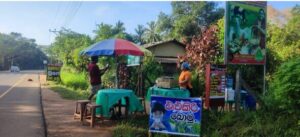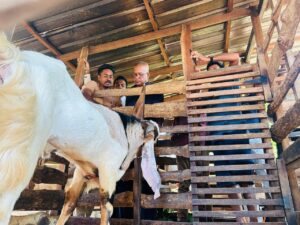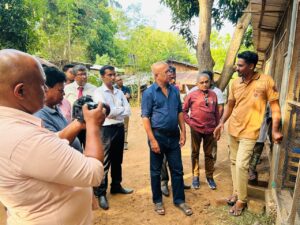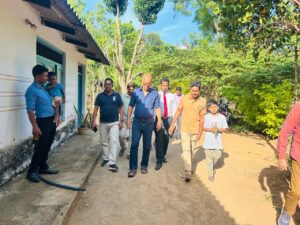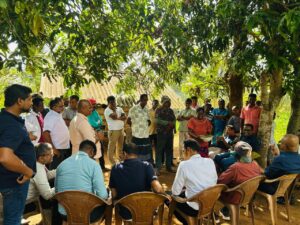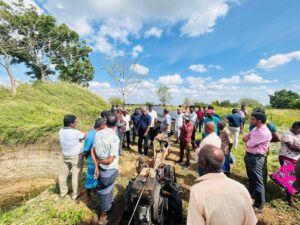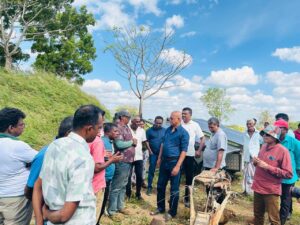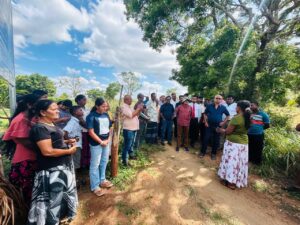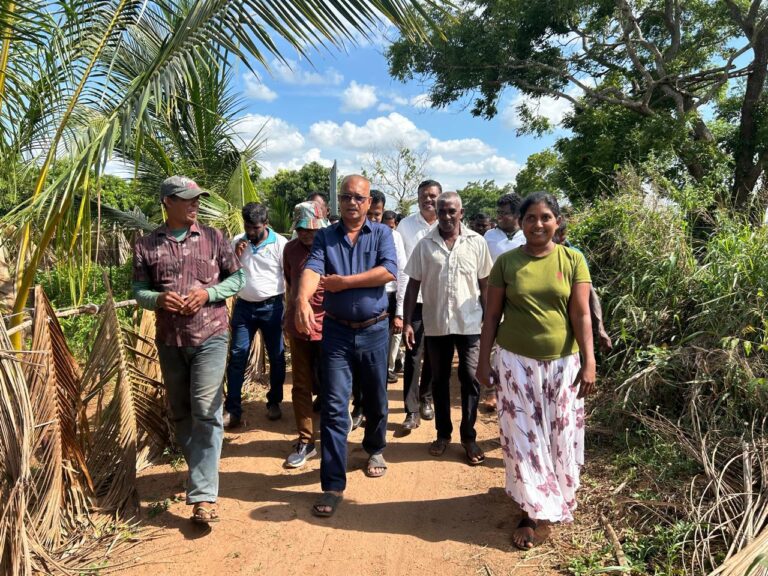
As part of the Climate Resilient Integrated Water Management Project (CRIWMP), two remarkable community-driven initiatives were showcased during a series of field visits held on 15th August 2025 in the Medawachchiya Divisional Secretariat, Anuradhapura District. These visits highlighted the transformative impact of climate-smart interventions on farming families, livelihoods, and rural ecosystems.
Located in Kanadarawa Grama Niladhari Division, Jinal Farmhouse is a thriving example of rural entrepreneurship and women’s empowerment. Owned and managed by a young woman with the steadfast support of her husband, the farm demonstrates how determination and innovation can turn a modest beginning into a model venture.
Starting with just two goats, she has expanded into a diverse livestock operation with goats, chickens, and ducks. Through CRIWMP support under the JSB Project, she received an animal feed processing center equipped with modern machinery, including a grinder, mixer, and pelletizer. With these facilities, she not only ensures high-quality feed for her animals but also adds value by processing feed for sale.
The farm now operates a chicken cage with a capacity of 240 birds, maintains 35 backyard hens with 5 roosters, 45 egg-laying hens with 5 roosters, and runs a hatchery incubator capable of holding 179 eggs at once. This transition has boosted her income, enhanced food security, and inspired other women in her community to pursue agribusiness ventures.
The site inspection was conducted by Hon. Minister of Agriculture, Lands, Livestock, and Irrigation, Mr. K.D. Lalkantha, together with Mr. D.P. Wickremasinghe, Secretary to the Ministry of Agriculture, Lands, Livestock, and Irrigation.
The second field visit focused on the Parasanwewa Upper Tank Catchment Development – Eco System Model, located in Thammennaelawaka within the Malwathu Oya basin. This initiative integrates catchment development with tank rehabilitation, ensuring the delivery of multiple ecosystem services that benefit both the environment and surrounding communities.
Key interventions under the project included:
- Soil bunds to control erosion and reduce sedimentation in the tank.
- Natural wind barriers such as tree girdles and live fences to conserve soil moisture, reduce evaporation, and prevent the spread of pesticides.
- Agroforestry systems, shifting from seasonal crops to perennials like TJC mango and coconut, with intercropping of pumpkin, Scotch bonnet chili, muriya, and watermelon.
- Climate-smart technologies such as solar-powered pumps, drip, and sprinkler irrigation to reduce carbon emissions and improve water-use efficiency.
The initiative, benefiting eight farming families, exemplifies how climate-adaptive practices can enhance resilience while sustaining rural livelihoods and ecological balance.
This inspection was attended by Mr. Sampath Manthrinayake, Secretary of Rural Development, and Mr. D.P. Wickremasinghe, Secretary of the Ministry of Agriculture, Lands, Livestock, and Irrigation.
Both the Jinal Farmhouse and Parasanwewa Tank Catchment models reflect the central vision of CRIWMP: to empower communities, strengthen climate resilience, and secure sustainable livelihoods in Sri Lanka’s dry zone. These initiatives also highlight the crucial role of women’s leadership, community participation, and innovative practices in shaping a resilient agricultural future.
